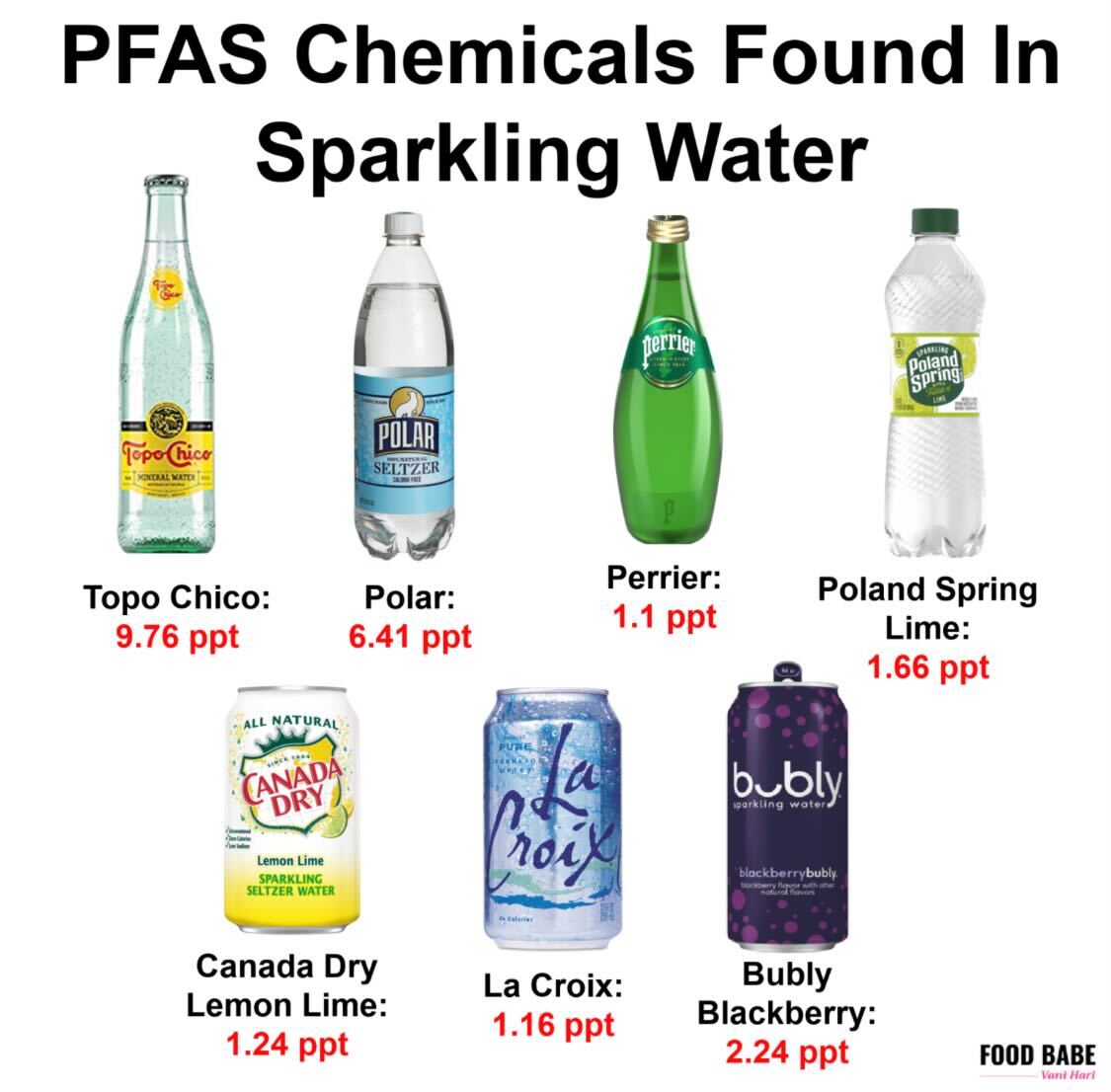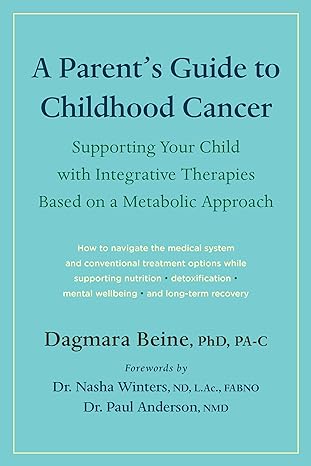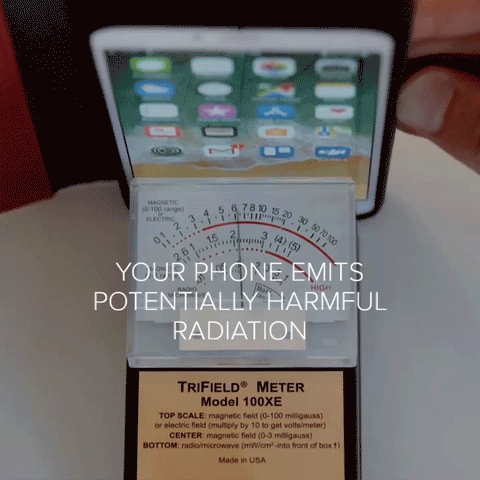When it comes to staying hydrated, many of us reach for sparkling water. It’s refreshing, often delicious, and can be a fun alternative to plain water. However, recent reports about popular seltzer brands containing high levels of PFAS chemicals have raised significant health concerns.
PFAS, or perfluoroalkyl and polyfluoroalkyl substances, are often referred to as “forever chemicals” due to their persistence in the environment and the human body. These substances have been linked to various health issues, including fertility problems, thyroid issues, cancer, and liver damage. They are found in everyday items like waterproof clothing, non-stick cookware, food packaging, and even dental floss.

*Chart from food babe IG
Despite alarming findings reported in 2021, regulation of PFAS chemicals has been slow. Although the EPA has recently started requiring utility companies to filter out PFAS, these limits are not yet enforced for sparkling water brands.
Environmental advocate and actor Mark Ruffalo has been vocal about the need for stricter regulations, highlighting the industry’s financial motivations for maintaining the status quo. As consumers, it’s crucial to stay informed and choose products that prioritize our health.
For cancer patients, selecting the right sparkling water can be especially important. Here are some brands that have taken significant steps to ensure their products are safe and free from harmful chemicals:

Spindrift
Highlights: Spindrift is a standout for its low PFAS levels (0.19 ppt). Each can lists the real fruit used for flavoring, offering varieties like grapefruit, mango, and the refreshing Nojito flavor (mint and lime). View on amazon.
Sound
Highlights: Sound is one of the few brands reporting zero PFAS levels. Their unique flavors, such as lemon with thyme and white tea, and rose with lime and hibiscus tea, offer a delightful change from the norm. View online.
Waterloo
Highlights: With BPA-free cans and ultra-filtered regional water, Waterloo is a favorite. Each can is sold within 500 miles of its source, emphasizing eco-consciousness alongside taste. View on amazon.
Mountain Valley
Highlights: Known for its non-detectable PFAS levels, Mountain Valley rigorously tests and monitors its sources. Their sparkling water is known for its crisp, satisfying carbonation. View on amazon.
Proud Source
Highlights: Proud Source commits to transparency with annual water quality reports and packages their mineral-rich water in recyclable aluminum bottles, which keep water cooler longer. View on amazon.
Nixie
Highlights: Nixie uses USDA organic ingredients without artificial additives, ensuring pure, flavorful water. Their reverse osmosis filtration effectively removes PFAS chemicals. View on amazon.
San Pellegrino
Highlights: A classic favorite, San Pellegrino maintains low PFAS levels (0.31 ppt). Their Essenza cans offer Mediterranean-inspired flavors that enhance any mocktail. View on amazon.
Aura Bora
Highlights: Filtered through reverse osmosis and free from citric acid, Aura Bora offers unique flavors like mango chili and tangerine blossom in recyclable cans. View on amazon.
DIY Sparkling Water
Highlights: Home sparkling water makers like Sodastream and Ninja Thirsti provide control over water quality and bubble levels. Using charcoal and reverse osmosis filters ensures the cleanest water possible.
Insights from Jess Kelley of the Oncology Nutrition Institute
In a recent podcast episode with Jess Kelley, founder of the Oncology Nutrition Institute, we delved deeper into the importance of hydration for cancer patients. Jess shared invaluable insights on maintaining proper hydration and the critical role it plays in overall health.
Key Takeaways from the Podcast:
Hydration is Crucial: Jess emphasized that water is the “master nutrient,” essential for nearly every biochemical reaction in the body. Proper hydration can significantly impact energy levels, cognitive function, and overall well-being.
Signs of Dehydration: Common signs include fatigue, hunger, mood changes, headaches, and constipation. Jess pointed out that even a 2% loss in hydration can impair physical and mental functions.
Water Quality Matters: It’s not just about drinking enough water but also about ensuring its quality. Jess recommended using reliable filtration systems like reverse osmosis to remove contaminants, including PFAS chemicals.
Balancing Hydration Sources: While sparkling water can be a refreshing treat, Jess advised that the majority of your daily water intake should come from non-carbonated sources. This helps ensure optimal hydration and reduces the risk of mild headaches or other issues associated with carbonated beverages.
Electrolyte Balance: For those engaged in intense physical activity or undergoing treatment that affects hydration levels, adding electrolytes can be beneficial. Jess highlighted brands like LMNT and Trace Minerals for their low-sugar, high-quality electrolyte options.
Practical Tips:
- Start your day with flat water to replenish overnight losses.
- Use herbal teas or infuse water with natural flavors to make it more appealing.
- Monitor your hydration status with at-home urine test strips to ensure you’re staying adequately hydrated.
By integrating these insights and choosing the right sparkling water brands, you can support your health and hydration needs effectively. For more detailed information, listen to our full podcast episode with Jess Kelley.
FAQs to Ask Your Oncologist About Diet and Lifestyle Changes
- What dietary changes can support my treatment and recovery?
- Are there specific foods or beverages I should avoid?
- How can I safely integrate complementary therapies, like mistletoe therapy, into my treatment plan?
- What lifestyle changes can help improve my overall well-being during and after treatment?
- How can I ensure open communication with my healthcare team about incorporating alternative treatments?
These questions can help you explore all available treatment options and ensure that your approach to care is comprehensive and well-informed. Listen to the podcast below to learn more about water.
Your donations power our podcast’s mission to support cancer patients with hope, insights, and resources. Every contribution fuels our ability to uplift and empower. Join us in making a lasting impact. Donate now! 🌟
Source links:
https://www.delish.com/food-news/g44663876/sparkling-water-brands-pfas-chemicals/
https://www.delish.com/food-news/a44566150/pfas-chemicals-sparkling-water-explained/
















